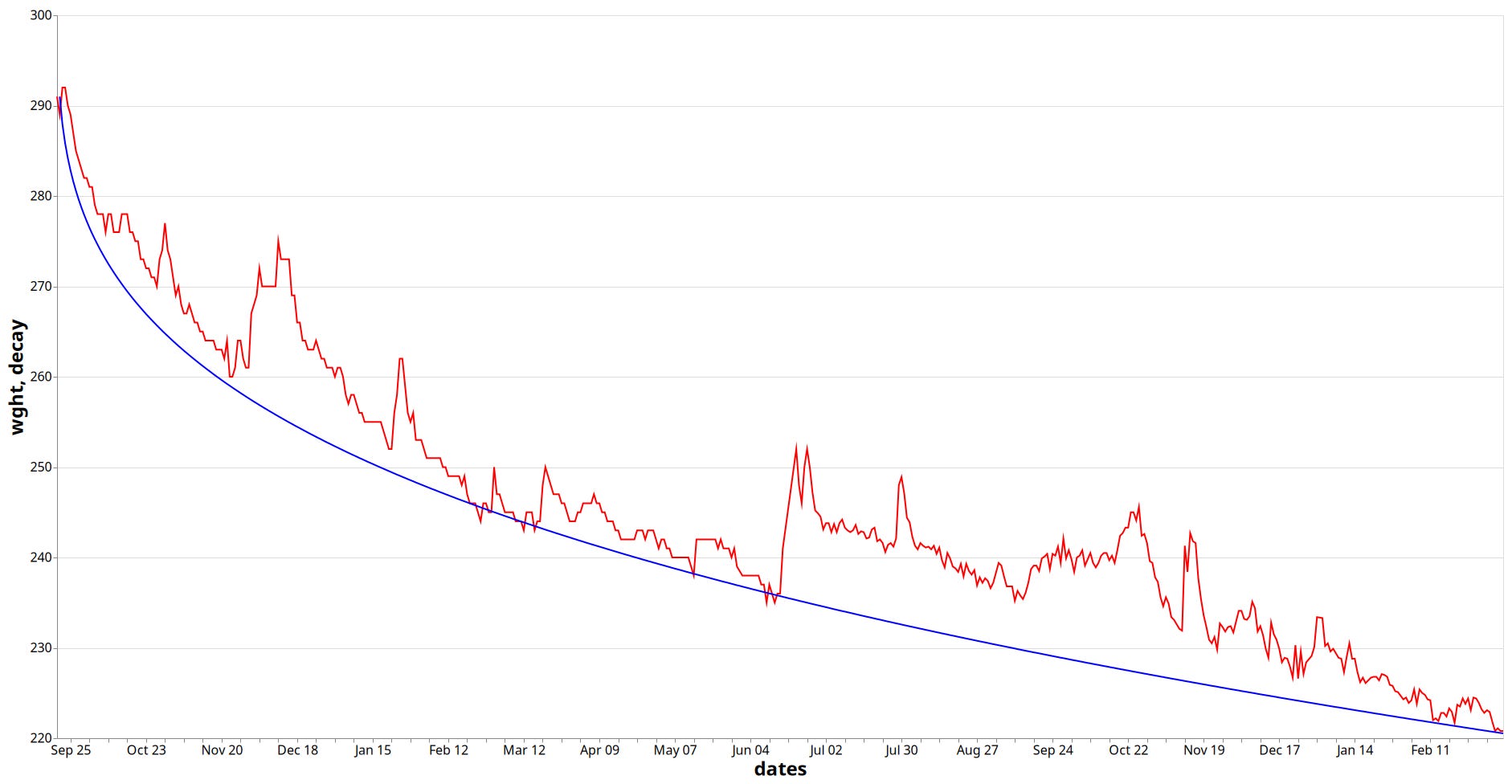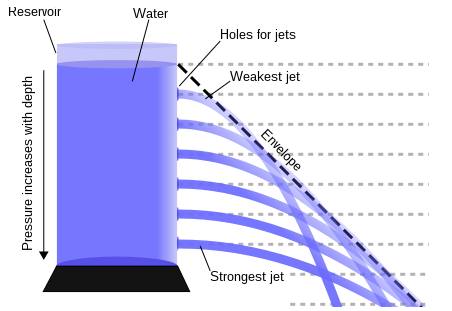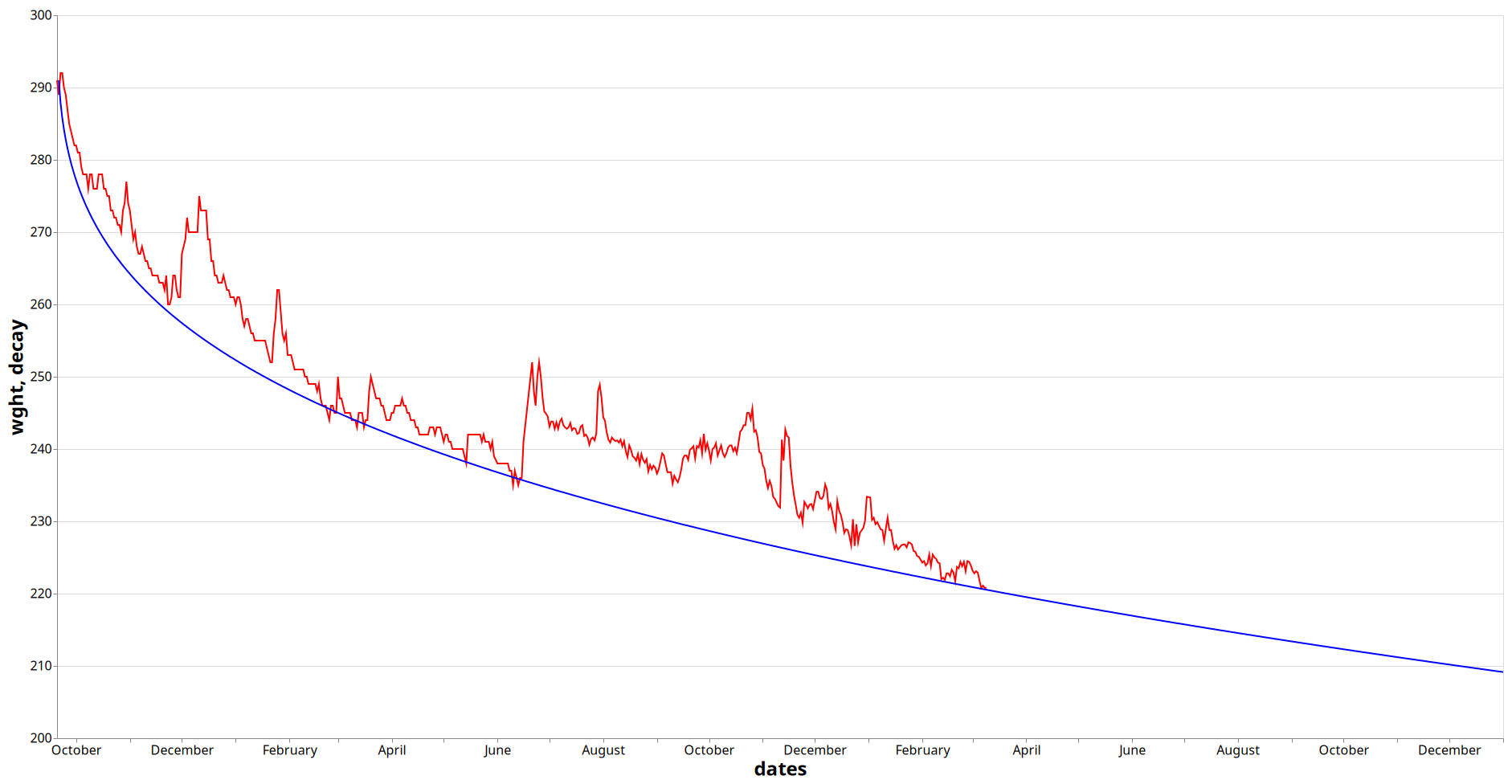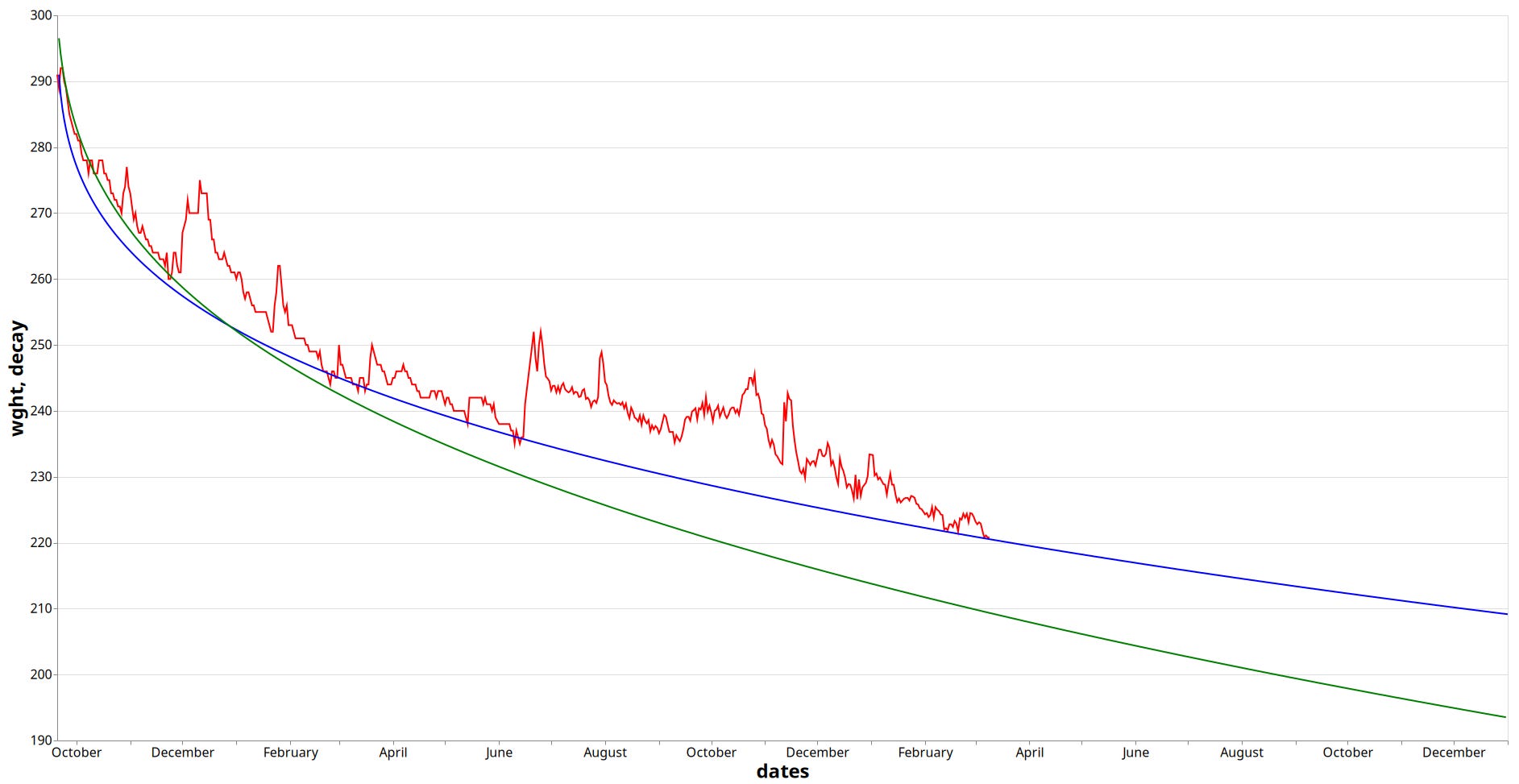Torricelli's Law for Fat Loss
What if it's just exponential/hyperbolic decay? Bucket of calories!
John from The Heart Attack Diet has been saying for a while now that my total weight loss since I started ex150 looks a lot like exponential decay.
Someone else in the comments to my last post pointed this out as well, and made some pretty good points. So I decided to try and overlay a function that matches my weight over the last 1.5 years pretty decently.
First I tried logarithms. I couldn’t easily get the curve to fit very well. I ended up just putting a handful of data points into an online calculator, and it spat out this function:
y = 304.991 - 13.9913 * x^0.285 (where x is days since start)
Let’s graph it:
Most of the periods when I was significantly above this line, I was doing some sort of high-protein refeed/experiment, or similar shenanigans.
The interesting point is that I apparently tend to lose weight as if this had never happened. So maybe I’m wrong about moderate protein or water retention, and I do “lose fat” during those periods? Or maybe that’s just the nature of fitting a curve to existing data points, and the curve would be much steeper if I’d never done those experiments.
Maybe there is some secret internal variable that slowly keeps gliding down along this curve, and if I fluctuate above that weight even for months at a time, it doesn’t matter in the grand scheme of things, cause my “setpoint” has been sliding down the whole time?
It’s tough to tell because we can’t actually measure what we want to measure, aka pure fat. Even DEXA is way too noisy for both fat mass and lean mass, as I’ve previously demonstrated. A 24h swing in water retention makes a bigger difference than most good weight loss months. And if I tried, I could probably triple that.
And what would the secret magic variable be? My “lipostat?” Some sort of cellular/brain equilibrium? Is it just the % of mitochondria in my body that have been un-PUFA’d since I started cutting out PUFAs aggressively with ex150?
What causes this curve?
There’s a physical law called Torricelli's law. It describes the flow speed and therefore strength of a jet of liquid, stating that it is a function of the height of liquid sitting atop of it in the container it’s flowing from. (I’m sure every guy reading this can relate.)
Imagine this bucket is filled with your adipose tissue, aka it’s a bucket of calories.
Fixing your metabolism (in whichever way) is like punching a hole into this bucket, presumably at a height of around your normal weight - meaning, if you just wait long enough (and don’t close up that hole) you’ll eventually end up around your normal weight.
But it would be totally expected that you’d lose fat much faster in the beginning, as there’s more “pressure” pushing down on the “liquid” going through the hole. The final few pounds would be a mere trickle. This is a common weight loss experience.
Of course the really interesting part is, "what is the magic button that punches the hole? What fixed the metabolism?”
Let’s assume for a second that it’s reducing dietary linoleic acid to ~2%, and restricting dietary BCAA intake to around 7% of total caloric intake.
If Torricelli’s law applies here, we would expect that, as long as I keep doing this, my weight will continue to drop along this curve, slower and slower as I get leaner and leaner, until it finally flattens out - presumably around 180-200lbs, since that would be +/- 10lbs of my normal weight. I bottomed out at 199lbs last time, but maybe I would’ve lost more if I had stayed abroad longer than 2 years.
Predicting future weight loss
What if we just draw the curve out further, say to the end of 2024?
This predicts that at the end of 2024, I’d weigh just under 210lbs. Honestly, that’d be a bit disappointing. Last time, when I was being way less strict with my diet, I lost around 100lbs in just under 2 years, ending up around 200lbs.
Especially my initial weight loss was much faster this time, so it feels like I should be at least as low after 2 years as last time, if not lower. After all, there’s quite a bit of room between the ~200lbs I reached last time, and the 188lbs that mark “normal weight” (by BMI) for me.
There are nearly 9 full months between now and the end of the year, and I was 220lbs this morning. That would mean losing only a bit over 1lb per month for the rest of the year. That seems pretty weak sauce.
I guess this is an interesting way of testing this curve. If I follow it exactly for the rest of the year, that could mean there is something “inherent” to it. If I lose weight faster (hopefully!), it could mean that this is just an overfitted curve, and the “summer of malaise,” when I didn’t lose any weight for about 6 months, was really just a waste of time caused by the experiments I ran (or other confounding factors).
Honestly, it feels to me like the only way I could lose so little weight in 9 months’ time is if I had another summer of malaise. Then again, it is nearly summer, and this is actually the Daylight Savings Time weekend.
Daylight Savings Time
DST messes me up for weeks up to a month or even two every year. If you don’t know how the circadian rhythm works: DST is so devastating for our sleep because it basically gives us an hour of jet lag every day. Unlike normal jet lag, this doesn’t go away for months, and we can’t adapt to it.
When you fly from the East Coast to the West Coast, you incur 3h of jet lag. But the sun at your new destination is in sync with the wall clock in that location, because that’s (roughly) how we determine wall clock. Every day, if you get some sun exposure in your new location, you’ll adapt a little bit. It takes about 1 day per hour of jet lag for most people.
When the DST switch happens, you only incur 1h of jet lag - but the sun didn’t change. Therefore, your body will not fully adapt to the new “time zone” and it’ll be like you fly an hour east every day. It will take a few months for the sun to actually come up earlier by an entire hour, depending on your location on the planet. During that transition period, your circadian rhythm will be out of sync with wall clock time.
I previously hypothesized that DST was the main cause for my weight loss plateau last summer. I suppose we’re about to find out if this year is a repeat.
Testing multiple projections
Testing the prediction of this curve could be interesting, but I immediately thought: what if I made several curves? Like I mentioned above, I intuitively think I’ll lose weight faster than the fitted curve predicts. Why not graph that one, too?
The blue line is the previous, fitted curve. The green line is what my intuition says. It would leave me at around 194lbs, 6lbs lower than I ever made it last time.
I also tried mapping out a more pessimistic curve, but that would basically just be a horizontal line, meaning I don’t lose any more weight between now and the end of the year (9 months!). Can’t go much slower than 1lb/mo, lol.
My prediction is that I’ll be somewhere between the 2 lines. The blue (fitted) curve feels very pessimistic already. The green line feels slightly optimistic: it’s a bit better than what happened last time, but not by much, and my diet is much more strict this time around.
Wish me luck.






DST isn't itself a problem, it's just highlighting a problem. Imagine someone who wakes naturally without alarms two hours before he starts work. In the spring, the clocks change, but he doesn't. He now wakes naturally an hour before he starts work. Nothing has to change for his health or his circadian cycle, the only change is what part of his waking day is consumed by work. Is it +2 to +11 or is it +1 to +10? If he doesn't like having only an hour before work, he can slowly shift his sleep cycle until part of the year he starts work at +3 and part of the year he starts at +2.
They can't take the sun from us. Clock-time is a tyranny and an imposition to begin with, but we don't have to let it touch anything except what 'time' we go to work.
If possible move towards having more flexibility in work hours and live life entirely by the solar time.
Ok now that I've performed my yearly ritual of DST hate, on to commenting about your actual point: I agree it looks fishy, and I'd wonder if you could fit that to bathtub sales (or whatever that joke meme datapoint is).
From what I've learned (lately, from you and the people you follow on twitter) my assumptions would be:
1) Primary initial weight loss (that portion of the first month exclusive of initial water weight drop) is a function of metabolic rate vs lean body mass.
2) For most dieters, metabolism slows due to starvation signals and effects of dealing with ω6FAs (from WAT and their food if they're e.g. going low fat).
3) It gets harder to stay on the diet due to signals (whether from dying gut flora, ω6FA munchies, or one of a myriad other symptoms of the broken homeostat).
These all together cause the typical tapering-off-and-stopping effect of most diets, which lead us to think of this as a law of nature, and mostly ignore stories of those who escape this.